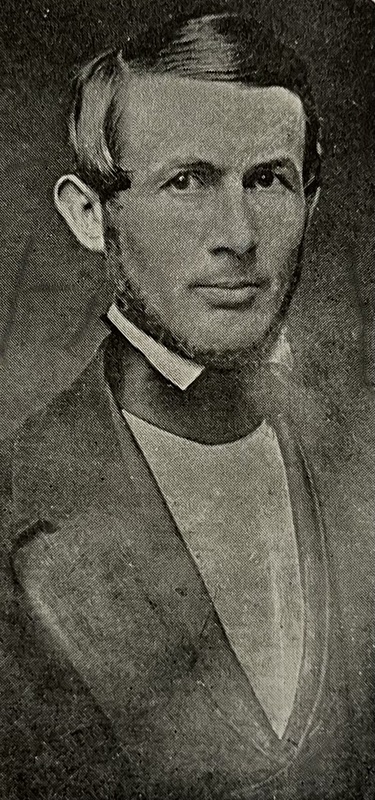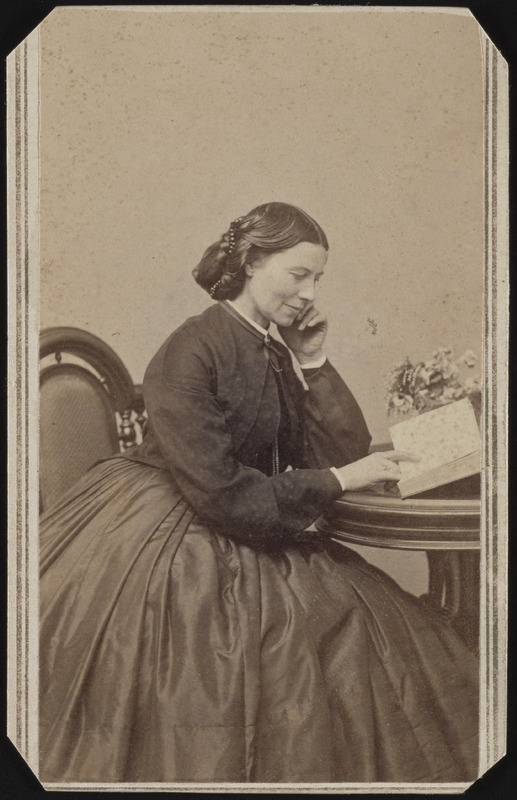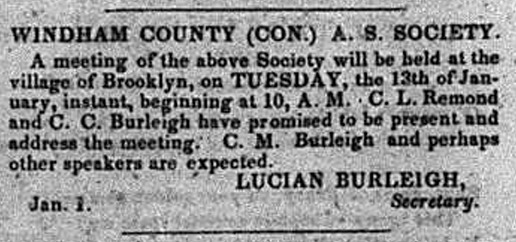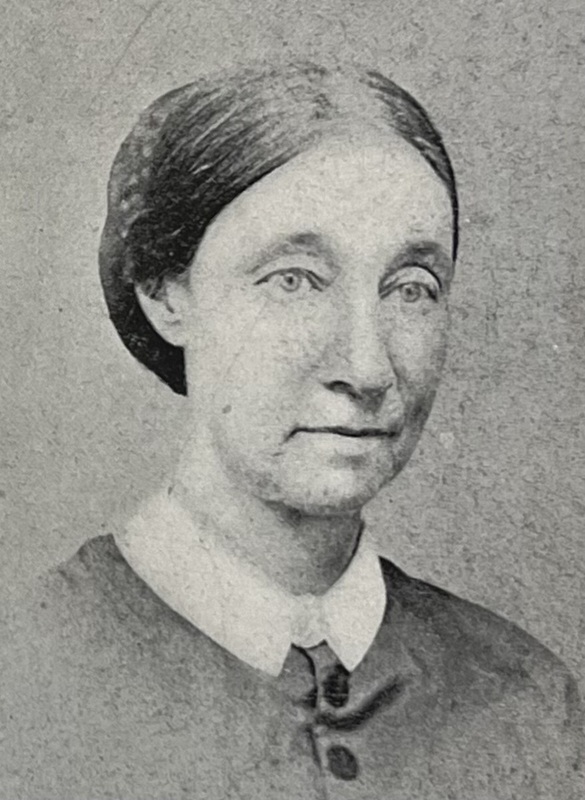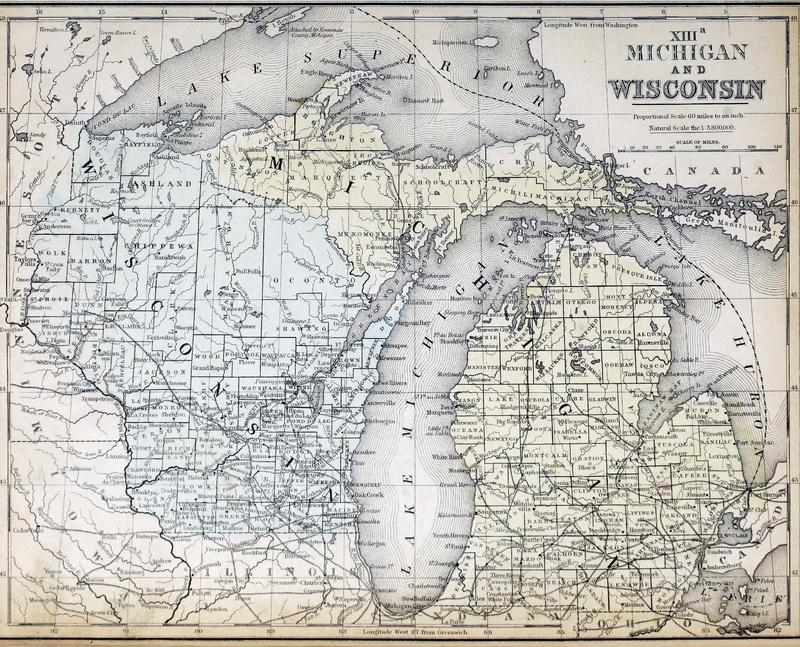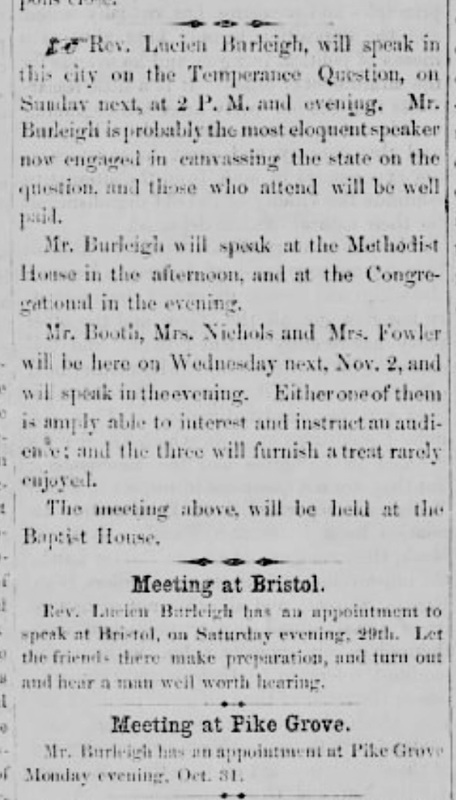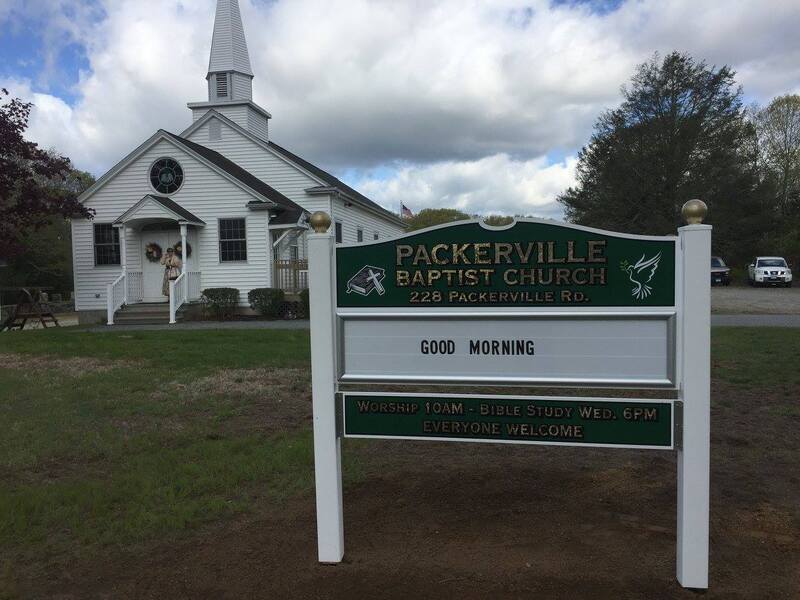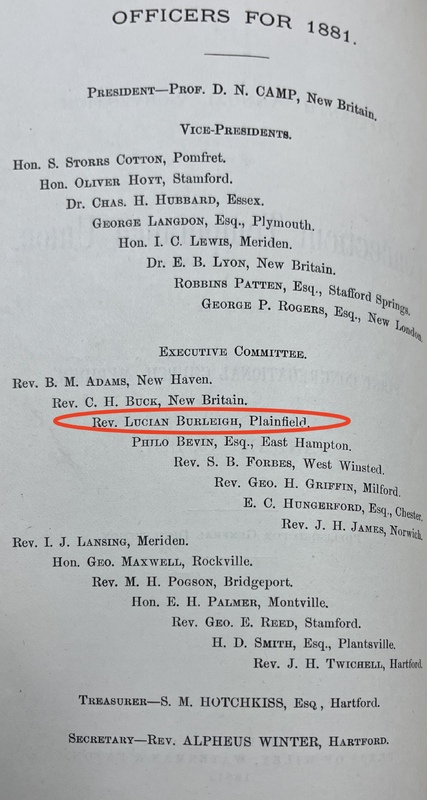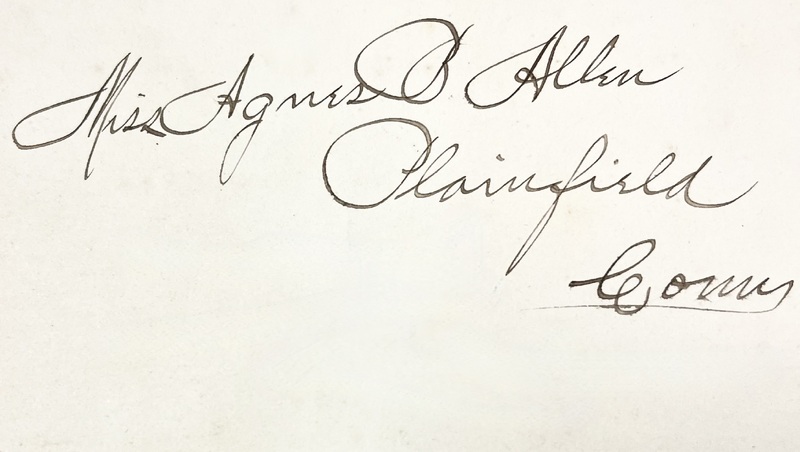Lucian Rinaldo Burleigh: Preacher and Teacher
Lucian Rinaldo Burleigh Basics
b. December 3, 1817, Plainfield, Connecticut
d. May 14, 1884, Plainfield, Connecticut
m. Elizabeth Morse Child (1813-1889), April 4, 1843, East Woodstock, Connecticut
lived in Connecticut most of his life, except for a brief time in New York City in the early 1850s.
I. Enigmatically Conventional: Lucian Rinaldo Burleigh's Storyline
There is a slippery quality to the life history of the fifth of the core siblings. Lucian can be described as conventional - he stays near home most of his life, is a farmer, a Baptist exhorter, and a temperance advocate. Yet he also had genuine Abolitionist credentials, a brief moment of romance (?) with Clara Barton, served as an officer of the Christian Union conference of 1840, and married into the Child family through his wife Elizabeth Morse Child, connecting him thus to David Lee Child and Lydia Maria Child. He is mistakenly listed as the author of his brother George's poem "Descent from the Cross" because Lucian was the person who read it aloud (in the language of the time, he "delivered" it).
At the present moment. no letters from his later life have been uncovered, meaning his personal life and relationships with his parents, siblings, wife, and children are nearly impossible to discern. He and Elizabeth had six children. Their most significant progeny was the father's namesake son, lithographer L.R. Burleigh, but all six of the children lived to adulthood, and five had children of their own, making the descendants of Lucian one of the most prodigious Burleigh lines.
He started his professional life as a teacher, before going back to Plainfield - presumably to assist his sister Mary with elder care for their parents - and taking up farming full time. He combined his two professional identities in a valiant, though ultimately unsuccessful attempt to resuscitate the Plainfield Academy, which had fallen on hard times. He also made a trip to Wisconsin to boost a moral reform cause about the suppression of vice (code for anti-prostitution).
As with his sister Mary, it is obvious that once his parents were deceased, Lucian could take on new missions in life. This is when he became an agent for the Connecticut Temperance Union, and was ordained as an evangelist by Packerville Baptist Church - the same church associated with Prudence Crandall and the Canterbury Female Academy. His contributions to the histories of Packerville Baptist and the Plainfield Academy are excellent primary sources for understanding the pre-Civil War decades in Windham county.
II. Schooling and Teaching - the Early Years of Lucian Rinaldo Burleigh
Lucian Burleigh was a student at the Plainfield Academy, and later at the fledgling Suffield Academy. He followed in some of his older brothers' footsteps by teaching at Killingly, Connecticut and Oxford, Massachusetts (both places where John had preceded him), and much later at his own alma matars of Plainfield and Suffield.
He had an intense epistolary episode with the famed Clara Barton when they were both young. They met when Lucian was teaching in Oxford, which was also when he had his formal conversion to the Baptist faith. To do so meant that he had been "born again in the Spirit" - an intense religious experience well-calculated to impress the mind of a (then) eighteen-year old. In a letter, he fervently wishes for Clara to have the same sort of experience.
Another important pro-feminist moment came in 1840, when he wrote to Maria Weston Chapman, asking her if the Boston Female Anti-Slavery Society could spare one of its gratis subscriptions to The Liberator for the still-young Suffield Academy library, where the newly-hired Lucian was intending to grow the Abolitionist presence on campus. The idea of this young man - albeit one with a storied family connection - would be beseeching a woman and a woman-led organization to assist him, says a lot about the gender dimensions of Garrisonian Immediate Abolition at the time of the famous schism.
As an educator, he also wrote materials for use in the classroom and for the moral edification of his students. One of these found its way into a quirky New York City periodical called "The Student," and then reprinted in the Anti-Slavery Bugle of Ohio. It is a truly awful story of a girl whose parents are drunkards but end up renouncing alcohol, entitled "Taming Wild Maggie, and the origin of the Day-School of the House of Industry." Here again we see how, even in the already tainted genre of sentimental prose writing for children, Lucian's talent level falls well below that of his literary younger brother George, whose short stories are strong examples of this suspect genre!
More to come!
Sources:
Lucien Burleigh, "Taming Wild Maggie, and the origin of the Day-School of the House of Industry," from The Student, reprinted in The Anti-Slavery Bugle (Lisbon, Ohio), Aug 20, 1853, p. 4.
III. Middle Age, Marriage, and the Farm
When Lucian returned to Plainfield in the early 1840s (precise date to be determined as evidence appears), he undertook an important anti-slavery role, serving as the secretary to the Windham County Anti-Slavery Society. This time coincided with the editorship of The Charter Oak in Hartford by his brother William (later assisted by George). Thus, Windham county notices were received and published with alacrity and attention.
The meeting highlighted in the Liberator announcement shown here featured three of the brothers - Lucian, Charles and Cyrus - along with African-American Garrisonian Abolitionist Charles Lenox Remond. Consider how, just 12 years earlier, the Canterbury controversy and The Unionist were battling against an abhorrent exclusionary racism, and how the Burleighs were among the few whites in the area to take the side of the African-American students - and do so loudly and boldly. Now in 1846 a different constellation of Burleigh siblings shares the podium in their home county with a noted Black male activist. The continuity of an anti-racism - and specifically an anti-racism that vigorously promotes, amplifies, and shares space with Black perspectives - is a crucial part of seeing their accomplishment as a white family.
IV. Wisconsin Temperance Work
Of all of the famed Burleigh siblings, Lucian has the honor of having lived the furtherest west, as he spent a year in Wisconsin doing Temperance work there. Wisconsin had only become a state in 1848, so it was still developing in terms of population, infrastructure, and economy. This intense campaign saw Burleigh visit at least 26 separate cities, villages and hamlets in less than a month! Amenities along the way were likely below what Lucian was used to in New York and Connecticut, but his dedication to the cause is manifest in this effort.
The goal of this concerted campaign was to enact a law similar to the "Maine law." This bill, the first sweeping regulation and prohibition of liquor sales in the nation, passed in 1851, and quickly became the aspirational goal of all state Temperance organizations. Temperance did not carry the day in 1853, but the next year Wisconsin did pass a bill similar to that of Maine's, only to see it vetoed by the governor. In a laudatory history of the Maine Law written in 1855, they describe the situation in Wisconsin thus:
In 1854 the people of this State voted by a good majority in favor of prohibition. This year the Legislature, in compliance with the will of the people, passed a prohibitory law. The Governor vetoed it, mentioning the causes to which he objected in his veto message. The Legislature, determined not to be defeated by this course, immediately amended the act by taking out the objectionable clauses. But the Governor again vetoed the bill, and there is a growing public sentiment in the State in favor of vetoing the Governor, which is likely to take place at the coming election.
However, this would never be the case for Wisconsin. Most scholars see the battles over temperance in that state as hopelessly embroiled in ethnic tensions between old white settlers from New England and immigrants who were from Germany and Ireland. We know the eventual result - beer would make Milwaukee famous!
Sources
Henry S. Club, The Maine Liquor Law: Its Origins, History and Results, including a Life of Hon. Neal Dow. New York: Fowler and Wells for the Maine Law Statistical Society, 1856., p. 87. Available at Internet Archive.
"Temperance," Online Exhibit, Wisconsin Historical Society, accessed August 1, 2025.
V. Connecticut Temperance Union work and Packerville Baptist history
After the death of his father in 1863, Lucian stepped up his activism, specifically around the Connecticut Temperance Union. It's unclear if he assumed that the Civil War had terminated the need for activism around slavery and race, or if he was returning to a real passion of his in Temperance. He took state leadership, and was an agent for many years, traveling around the state.
Since he had been too young to take an active part in the Canterbury Female Academy in 1833-34, his major contribution came years later, when, during the remembrances of the history of Packerville Baptist Church, he recorded how the Reverend Levi Kneeland had welcomed the Black students into his congregation when they were forbidden from the Congregational Church on the Green. As part of this, he joined the family tradition of poetry, writing verses in commemoration of Levi Kneeland:
Some still survive who yet remember well
What earnest words he spoke, how sweet his life,
How prayerful was the spirit that he bore,
What love for souls, what zeal for Christ he felt.
Who of all those that ever heard his words
Can e’er forget the holy zeal he showed,
The blessed unction that he ever bore,
God’s witness evident on face and mood,
Heaven’s high approval of his honest work.
References:
Larned, Ellen D. History of Windham County, Connecticut: A Bicentennial Edition. 1874. 2 vols. Chester, CT: Pequot, 1975; v. 2, p. 416 for Lucian's poem.
““Be Ashamed of Nothing But Sin”: Prudence Crandall, Levi Kneeland, and Connecticut Baptists.” American Baptist Quarterly, 34:3-4 (Fall-Winter 2015): 324-342.
VI. Family and Legacy
Lucian Burleigh's son and namesake, L.R. Burleigh, is profiled separately in this project. That son's grand-daughter Agnes Burleigh Allen (1873-1932) also took care to sustain the family legacy. In 1911, the two of them were working together in the Plainfield Academy Alumni Association, as seen below. Agnes also shared the daguerreotypes of her great-grandfather Rinaldo, grandfather Lucian (seen above), and great-uncle William, that form a part of Bowen's History of Woodstock, Connecticut. Agnes also gave the live reading of her great-uncle George's poem celebrating Plainfield's anniversary:
NOTE!
Lucian Burleigh's first name appears as both LuciAn and LuciEn, in various printed and personal sources. The anomaly in spelling is too endemic for this website to make a choice unimpeachably correct. Instead, an arbitrary decision to go with LUCIAN has been made throughout. But the primary sources that use the "E" variant have been maintained in the original.


